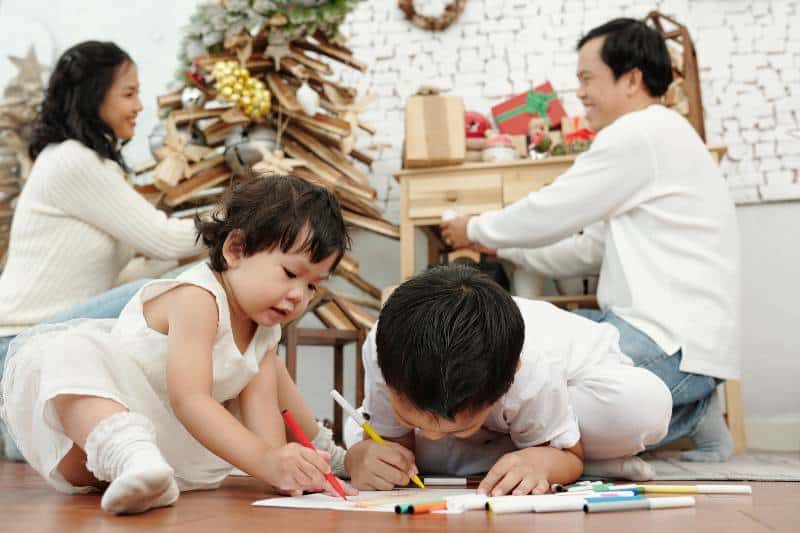Living Abroad with Children: Tips for Success
Are you thinking about moving abroad with your children? It can be a daunting task, but it can also be an incredibly rewarding experience. If you are prepared for the challenges that come with living in a foreign country, your family can have a great time exploring new cultures and making new friends. In this blog post, we will discuss some tips for making the move abroad as smooth as possible for your little ones!
Living abroad with your younger children can be a truly rewarding experience. It’s an opportunity to share new cultures, get out of your comfort zone, and make memories that will last a lifetime.
Key Takeaways
- Don’t underestimate the importance of your children’s education.
- Be prepared to invest in your children’s education abroad, including paying for private schools and tutors.
- Look into local or international programs that support children’s education abroad, such as “World school” or the International Baccalaureate Program (IB).

Why Move Abroad With Your Kids
Moving abroad with your kids is a big decision. It’s not something to be taken lightly, and you should have a good reason for making the move. Here are some of the most common reasons why people decide to move abroad with their kids:
- They want to experience another culture
- They want their kids to grow up in a different environment
- They want to live closer to family members who live abroad
- They want to expose their children to other local languages and cultures
- They want their children to learn about the world around them
Preparing for the Move
Moving abroad with your kids can be a huge change for everyone involved. It’s an exciting adventure, but it also requires a lot of preparation and planning. The best way to make the transition smooth is to start preparing as soon as possible. If you’re thinking about moving abroad with your kids, here are some things to consider:
- What is the climate like? Will there be any major changes in weather or temperature?
- How will school systems differ? Will they be able to continue their education easily?
- How can you ensure that your children maintain their cultural heritage while living abroad?
Easing the Transition
Moving abroad with your kids can be one of the biggest transitions of their lives. It can also be a great experience for them to learn about other cultures and make friends in new places. Here are some tips to help ease the transition:
- Take time to make sure your kids are comfortable before leaving. Talk with them about what they’ll miss and how they feel about moving. Make sure they know that this move is not permanent, but rather a temporary change in location so that everyone can grow as individuals and as a family unit.
- Make sure your children have access to familiar toys and games from home, especially when traveling by plane. This will help them feel more comfortable during the trip.
- Consider hiring a tutor or babysitter for your children while you get settled into your new home so that they can maintain friendships with people who speak their native language and share similar interests. This will help make them feel at home in an unfamiliar environment.
- If possible, try visiting your new country several times before moving there permanently so that both you and your child become familiar with it beforehand—this will allow both parties to get used to each other’s presence before making any big changes!
Biggest Concern Of Living Abroad With Kids
Social Life and Friends
The social life and friend circle is a big concerns of living abroad with kids in Thailand.
Thai children are very shy, so they will not talk to strangers easily. They will tend to be more reserved around people they do not know. This can make it difficult for you to make friends with the locals. You might want to consider getting a Thai tutor for your child so that he or she can learn how to communicate better with the locals.
Another thing you need to be concerned about is that your kids will not have any friends from their age group who speak English or another language that they understand. If this happens, then it may become difficult for them to communicate with other children without having a translator around all the time!
School and Education
There are many international schools in Thailand, and you can find one near your home. These schools offer the same curriculum as other international schools around the world, but they will be taught by Thai teachers who speak English. Some of these schools have American or British principals who have worked at other international schools and can help ensure that your child is getting a quality education.
Fears of adjusting to a new location
The biggest concern of living abroad with kids in Thailand is adjusting to a new location. The culture, the weather, and even the language can be very different from what you’re accustomed to. It’s important to try and adapt your lifestyle as much as possible so that it’s comfortable for everyone involved.
Benefits Of Traveling Abroad For You And Your Children
As a parent, one of the biggest concerns you might have about traveling abroad is how to keep your children safe. Although traveling as a family can be a lot of fun, it also requires a lot of planning and preparation. Traveling outside of your home country can be especially challenging for kids because they don’t always understand the new culture or feel comfortable in the unfamiliar surroundings.
If you’ve ever struggled with the decision to travel abroad with kids, here are some of the benefits that may make it worth it:
1. Learning about other cultures: One of the best ways to help children learn about other cultures is through immersion. Traveling abroad can give children exposure to different ways of life and provide them with opportunities to interact with people who are different from themselves. This type of exposure helps build empathy and understanding among kids who are growing up in an increasingly globalized world.
2. Building stronger relationships: When ex-pat families travel together, they often experience stronger bonds with each other because they have shared experiences together during their journey (i.e., seeing new places together). This can help improve communication between parents and older children as well as siblings by making them feel more connected on an emotional level as well as physically closer than before due to the shared experiences.
3. Broadening horizons: When kids travel, they are exposed to new cultures, customs and traditions which can help them understand the world in a more global perspective. They learn about different people and places that exist beyond their own backyard and it also helps improve their communication skills because they have to interact with others from different backgrounds (i.e., language barrier).
Before You Depart: Do your homework
Preparing your children for the move
This can help them better understand why you’re making this decision. Show them photos of the area you are moving to, talk about how far it is from home, explain how long it will take to get there and what the weather will be like.
Involve Your Children in the Planning Process
If you’re going to move, make sure your children are involved in the planning process. This is especially important if they are young and have no say in where they will live. By involving them in the decision-making process, it helps them feel more connected to their new home and therefore less likely to miss their friends back home.
Location, location, location
When deciding where to move, think about how close you want to be to family or friends. If you have children, consider their school districts as well as what kind of activities are available in the area. If your children are young and will be starting school soon, find out if they can transfer their records from their previous school district.
Playing it safe
If you are moving with your children, it’s important to take all of these factors into consideration. Moving is a big adjustment for everyone involved and can be stressful, especially if there are young children involved. Thinking about these issues before you move, it can help make the transition easier for everyone.
Help Your Children Say Goodbye
One of the most difficult things about moving with children is saying goodbye to their friends and familiar surroundings. If your child has a hard time coping with change, try to make them feel as comfortable as possible. Make sure they know that they can talk to you about anything that’s bothering them and help them find ways to deal with their emotions.
Carefully Consider Your Education Options
One of the most important things to consider when moving with children is their education. If you’re moving somewhere that doesn’t have a good school district or your child is enrolled in an after-school program they love, it can be hard to leave those behind. Talk to your kids about their feelings and try to find new schools or programs that will allow them to continue doing what they love.
Protect Your Kids With Life Insurance
If you’re moving away from the home you currently live in, it’s important to make sure your children are taken care of if something were to happen. Life insurance can help provide for your family if you pass away unexpectedly. If not, it can help pay for things like college tuition or medical bills.
Once You Arrive
Get to Know Your New Home Abroad
There’s nothing like moving to a new country to make you feel like an outsider. Try to get out and explore your new home as soon as you can. The more familiar you are with the area, the easier it will be for everyone in your family to adjust. If possible, arrange for a short trip before moving so that your kids can see what their new home will look like and experience some of its culture firsthand.
Making your new house a home
This can be the key to making your family feel more at ease in a new place. Try to make your home as welcoming as possible by hanging pictures and posters from back home, arranging furniture in rooms so that they feel familiar and comfortable, and decorating with some of your favorite things from back home.
Put the family to work
to help make the house feel like it belongs to you. Have your kids help pick out new furniture, paint walls and trim—whatever they can do to make their own mark on the place. to help make the house feel like it belongs to you. Have your kids help pick out new furniture, paint walls and trim—whatever they can do to make their own mark on the place.
Moving to Thailand with With Children
Adjusting to life in Thailand
It’s important to remember that you’re not just moving from one place to another, but also from one culture to another. Your kids will have questions about what it means to be Thai and how different their lives will be here compared with back home. They may miss their friends or the things they had access to at school, like after-school programs or special events like field trips and assemblies.
Seek help from Thailand Expat Community
As you settle in and make the transition to living in Thailand with your children, it’s a good idea to get involved with the local ex-pat community. Many people who have already made this move will be happy to offer advice or help answer any questions you might have about settling in. You can also find plenty of useful information online, including blogs written by other ex-pats as well as resources like expat forums.
International School Options
As you explore the different ex-pat communities in Thailand, you’ll also want to investigate your options for international schools. These schools are often located near major cities and are designed to help prepare students for a life outside of Thailand. They offer courses that include English language classes as well as instruction on other subjects like math and science.
Make sure to check out the article I wrote, you can find the best international schools in Thailand here.
Living Abroad With Children FAQS
Is living abroad good for children?
Yes, children can benefit from a life in a new environment. They will have the opportunity to learn valuable language skills, make new friends, and form relationships with people from different cultures. Living abroad also gives children the chance to gain independence by exploring new places and making decisions about their own lives.
How does moving abroad affect a child?
Moving abroad can be a big change for both parents and children, as it involves leaving familiar surroundings behind. However, there are many ways to make the transition easier for everyone involved. For example, you could start by introducing your child to the new country before you move there full-time. You could also try to find an international school that teaches in English so that your child can continue learning without any interruptions.
What age is best to move with kids?
Experts recommend you move with your kids that are school-age children (when they are between 5 and 8 years old) because the children at this age can understand what is going on around them.
What are the positive effects of moving on children?
Moving with your children can have many positive effects on a child’s life. It can help them develop new skills, such as independence and responsibility, and make them more adaptable. Moving also helps children become part of an international community, which is great for their social development.
What are the effects of living in another country?
The effects of living in another country are different for every child, but they can be positive overall. Children who move to another home country will have the opportunity to learn a new language and culture, which is a good way to prepare them for the real world. They’ll also develop an appreciation for other cultures, making them more open-minded individuals.
Conclusion
Moving can be stressful for children and parents, but it’s a necessary part of life. While there are many benefits to moving, such as experiencing new cultures and meeting new people, it’s important to keep in mind the potential downsides. Moving can disrupt your child’s education by forcing them to switch private schools or change their curriculum; this could cause them to fall behind their peers who stayed put.
Remember to subscribe to our newsletter for the best information about living in Thailand or reach out to us with any questions!






